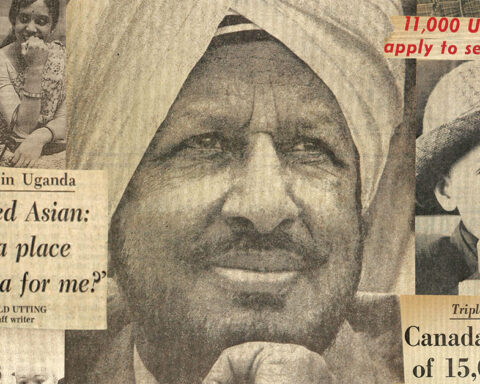Anyone who has travelled to subcontinent knows it is not always such a salubrious destination. Incredible India, as the country sells itself in tourism brochures, can be incredibly chaotic, unwieldy, hot, dusty, venal, bovinely, and polluted – and then you accidentally end up drinking the water.
Given his weakened state since returning to Canada, Canada’s Defence Minister, Harjit Sajjan, has no doubt picked up a severe political bellyache from his recent week-long trip to the country.
In what should have been a soft PR exercise, Sajjan’s first trip to India as Canada’s Defense Minister, has gone from being an electoral victory lap in his birth country to a slog on Ottawa’s apology circuit.
The trip has brought into question his integrity as a leader, diminished his venerated standing before military personnel, and even dulled his image within the Sikh community.
During a speech at the Delhi based Observer Research Foundation security think-tank, Sajjan veered off script and deliberately inserted a line about being ‘the architect’ of Operation Medusa, a large-scale Canadian offensive in Afghanistan in 2006. It was a false statement: in Kandahar, where Sajjan served three tours while a reservist, he was as a mid-level officer providing intelligence to his commanders.
At his first sitting in the House of Commons on Monday, the minister, looked weary from repeating contrition for the battlefield boast, but failed to provide an explanation for it.
“I’m not here to make excuses,” he said to the press gallery. “I’m here to acknowledge my mistake, apologize for it, learn from it and continue to serve.”
Not since the cameras showed up at Premier Glen Clark’s house, had a BC politician seemed in such desperate need for a foxhole.
It’s not unusual for Canadian immigrants to flash their success when they return to their homeland – Sajjan also made a visit to his birth village in the Punjab on this trip. These blingy displays however tend to be exhibited through heavy gold sets and brand name clothing, and not, as in the Minister case, through false claims of military prowess.
Had it been Sajjan’s only embellishment of his operational role, this errant speech could have been written off as typical politician’s self-aggrandizement. However, he also stated this alternative fact in an interview in 2015.
While this controversy has hogged the spotlight back in Canadian media this week, it was not the only trouble spot arising from his first visit back to India in 14 years. The Minister’s tour, particularly of Punjab, was notably bumpy as the Chief Minister of the state, Captain Amarinder Singh and his cabinet, refused to meet with Sajjan.
Singh alleged that the minister and his father, Kundan Sajjan, a former executive of the World Sikh Organisation (WSO), are both Khalistan sympathisers. At the height of the Punjab conflict in the 1980’s, the WSO espoused the formation of an independent Sikh state.
The allegation against the minister is baseless and seems motivated by Singh’s bitterness at the Trudeau government. The Canadian government did not permit Singh to campaign last year among Canada’s one million-plus South Asians, forcing Singh to cancel the Canadian leg of his North American tour.
The Punjab Chief Minister’s rebuff, however, did little to help Sajjan’s mandate of advancing Canada-India relations, or of re-energising stalled Canada-India free trade talks which were first launched in 2010.
However, Sajjan’s most agonising moments during the week-long trip may have been in his circumspect responses to questions about the Ontario NDP provincial government recently passing legislation recognising the 1984 Delhi killings of Sikhs as an act of genocide. By some counts, as many as 30,000 Sikhs were killed by Hindu mobs in a four-day murderous frenzy.
In 2011, Surrey-Newton MP Sukh Dhaliwal was the first federal MP to petition for the recognition of the 1984 killings as an act of genocide, receiving support then from the current Minister of Innovation, Navdeep Bains. Dhaliwal was denied a visa to India in 2011, retribution for him spearheading this motion.
The failure of the Indian government to prosecute the government officials who organised the mobs has been a source of much pain for Sikhs worldwide for the past three decades. Sajjan however distanced himself from the motion.
In a stumbling response, he highlighted it was brought forward by a private member of the Ontario legislature (Harinder Malhi), insinuating the motion was politically motivated during an election year in the province. He further added that this was not his position as a member of the federal Liberal government.
Sikhs who were hopeful Canada’s most recognizable cabinet member would help resolve this long outstanding social justice issue were clearly disappointed in these answers. Left in the wake of Sajjan’s India trip are gnawing questions about how much of his cultivated image as Canada’s ‘badass’ minister, and a comic book hero for justice, is truth and how much is hyperbole.
Afterall, why would he distance himself from a social cause as glaring as the Delhi killings? And why would a veteran break the military code about boasting and take credit for the sacrifices of other soldiers?
After nearly 18 months in office, it seems all we have learned about the first term MP from Vancouver South is that it’s hard to gauge exactly where the soldier ends the politician begins.
Jagdeesh Mann is executive editor of the Asian Pacific Post. This article has been republished under arrangement with the Post.
Jagagdeesh Mann is a Vancouver-based entrepreneur and a founding partner of the Asian Pacific Post, a Jack Webster Award–winning publication. His work has been published by the Toronto Star, the Georgia Straight, the Globe and Mail, the CBC, and Canadaland.




